NST Initiatives
NST suggested to have Review Seminars in different languages to celebrate GOLDEN JUBILLE OF VATICAN II & SILVER JUBILEE OF THE FABC 5TH PLENARY ASSEMBLY STATEMENT 1990. As these had affected many changes in the Way of Being Church in India.
1. As a result the first Review Seminar was conducted in Pune for English speaking group from 25 to 28 August 2015
.jpg)
.jpg)
.jpg)
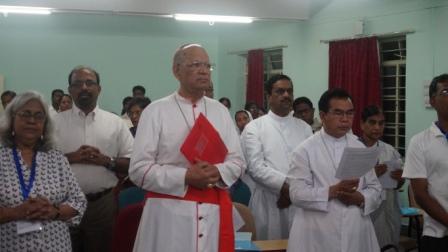
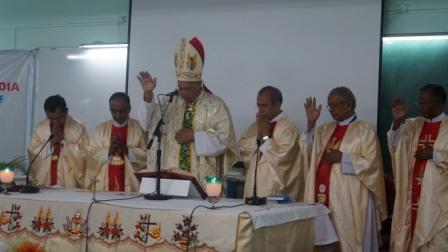
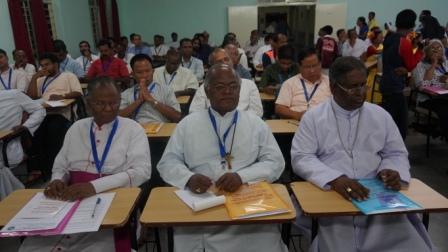
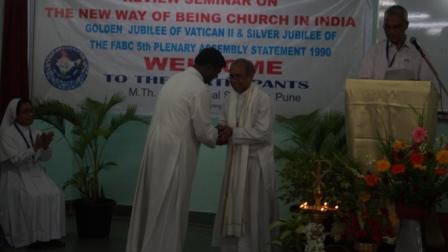
.jpg)
2. Second one was conducted in Dumka from 16 to 19 September 2015, for Santal speaking SCCs. 600 Participants came from 18 dioceses of Bengal, Assam, Bihar and Jharkhand. Last day for a public Bible Solemn Bible procession to witness to the Power of the Word of God which is active and alive in our midst, calumniation of all the celebrations 8000 people participated. It was organized by Sr. Christin, H.C NST member with the help of local Team in Dumka diocese, Jharkhand
.jpg)
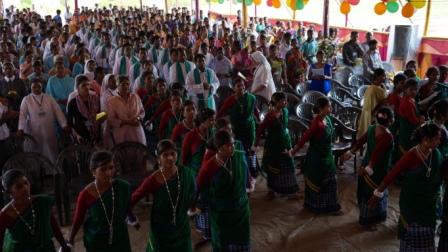
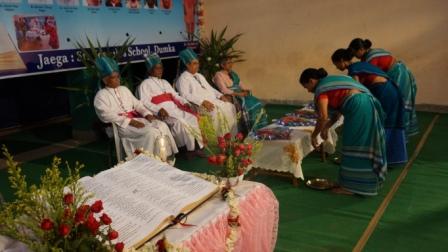
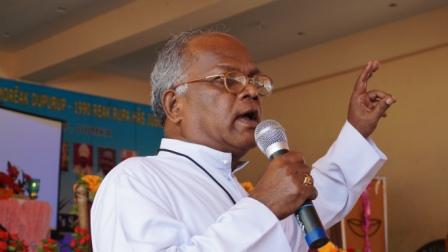
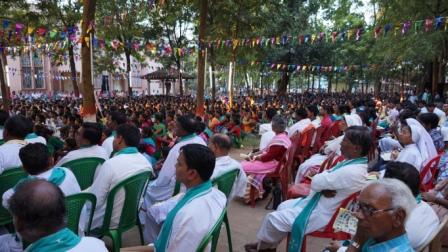
.jpg)
.jpg)
3. Third Review Seminar in Hindi was conducted in Delhi from 7th to 10th April 2016. It was organized by Fr. Peter Emmanuael, then NST member.
.jpg)
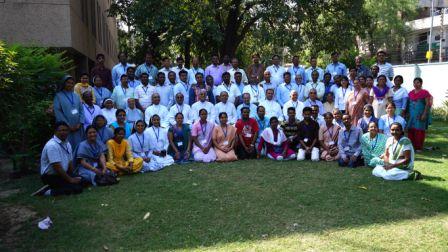
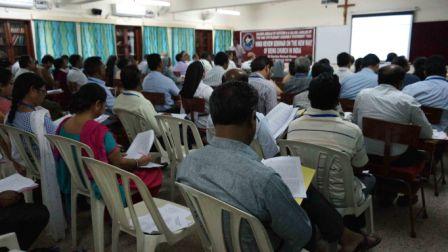
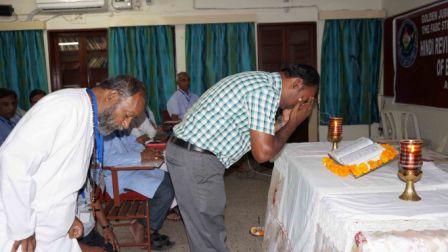
.jpg)
4. Fourth one was held in Hazaribagh, Jharkhand in Hindi from 9 to 12 October 2016. Organized by Sr. Christin, H.C NST member with the help of local Team in Hazaribag, Jharkhand. 700 people from 17 dioceses of Tribal belt that is Orissa, Chhattisgarh, Bihar, Jharkhand and West Bengal took active part in it.
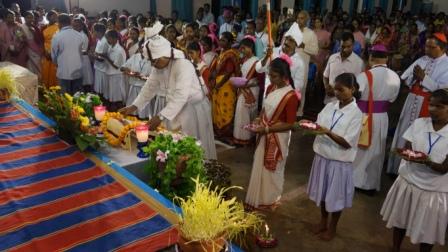
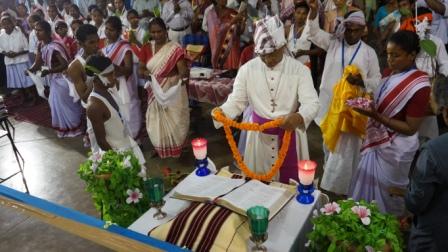
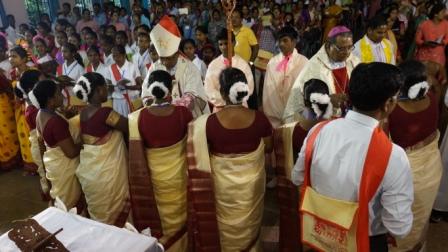
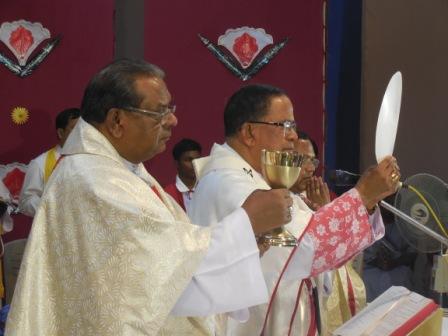

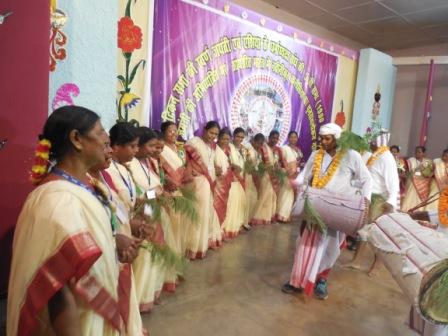
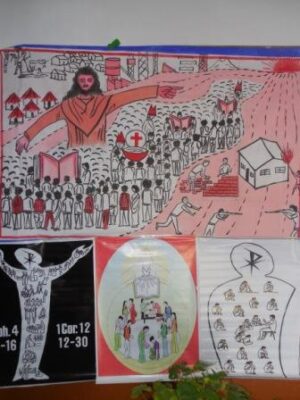
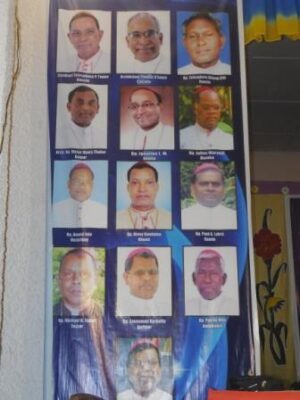


 The Bishops of Tribal belt along with National Secretaty Fr. Vijay Thomas and Sr. Christin. H.C NST Member.
The Bishops of Tribal belt along with National Secretaty Fr. Vijay Thomas and Sr. Christin. H.C NST Member.
NST Meeting 2017
NST meeting took place on 24th January 2017 in PAC, Nagpur.
New members were added to the Team


Rev. Fr. Philip Kattakayam
Executive Secretary, Commission for Laity
Mob: 9473251138
Email: kattakayam@yahoo.com

Fr. Steevan D’Souza, SFX
Mob: 8884941412
Email:steevan_@hotmail.com

Jennifer Fernandes
Mob: 9820121849
Email:jennynazareth@gmail.com

Sr. Gracemary
Sisters of Mary Immaculate
Mobile: 08335817108
Email:gracemarysmi@gmail.com
NST planned the following Regional programmes for the year 2017
February 23-26 : NE SCC Festival
March 13-19 : Orissa region
April 25-30 : Jharakhand & Bihar
May 3-7 : West Bengal/Sikhim
June 1-6 : SCC Youth camp at PAC
July 10-12 : Northern Region
July 17-19 : MP Region
September 5-8 : RRT Agra
September 14-17 : RRT TN
September 26-29 : NE SCC Regional Council
Oct 6-8 Kerala SCC Convention at Ernakulam
Oct 10 – Nov 9: SCC Theology course PAC (to be confirmed)
November 20-24 : RRT AP/Telangana
NST meeting was followed by NCSCC (National Council for Small Christian Communities)
Theme: SCCs are Missionary Communities
Nagpur :
The National Council of SCCs proposed for Self-ministering and self-supporting communities during the annual meeting Jan 25 to 28, 2017 in Nagpur. Fourty five laity, religious, Bishops and priests had a soul searching meeting to reflect on the Missionary role of SCCs in India.
Quoting the First Goa National Convention final statement of 2013, Bishop Thomas Dabre of Pune invited all “to open our hearts to the wider society in our quest to be Church in a more authentic way… the love of Jesus demands love for all those around us and a readiness to be at their service”.
Bishop Dabre invited all “to plan well with personal and community discernment in the light of the Word of God, reflection, consultation, competence, suitability, need, skills and formation for Ministering”
Bishop Selvister Ponnumuthan of Punalur reminded all that all faithful have fundamental duty to carry on the Mission of Christ. Quoting St John Paul II, Bishop Selvister said, “The Basic Ecclesial Communities decentralize and organize the parish community to which they always remain united. So that all parishes may be truly communities of Christians, … local ecclesial authorities ought to foster living communities where the faithful can communicate the Word of God and express it in service and love to one another… these communities are centers of evangelization in communion with their pastors”.
There are about 84,000 SCCs in India, said Fr.Vijay Thomas, Secretary of National Service Team (NST) of SCCs. Every SCCs need at least three animation sessions during the year for sustaining, said Fr. Vijay. Thus the National Council of SCCs decided to conduct regional training for Resource Teams in different parts of India during 2017.
The participants visited St. Martin’s Parish of Nagpur conducted an animation session prepared by Fr. Vijay Thomas and Sr. Christin during the SCC meeting on “SCCs are self-propagating, self-Ministering and Self-supporting communities” in 10 units. Fr. Jerome Pinto, Parish priest welcomed all the participants and introduced them to his parishioners.
All the regions also presented a brief report of their SCC promotion during the year 2016 for the knowledge of all. Bishop Ignatius Mascarenhas of Simla- Chandigarh and NST chairperson congratulated all the participants for their committed works in the region.
Sr. Christin, HC of Calcutta and Fr. Gregory Arby of Alwaye shared their experience of Ministries in the SCCs. The National Council members planned to introduce ministries through SCCs in their dioceses. The ministries will enhance the functioning of the Parishes, said Bishop Clement Tirkey of Jalpaiguri.
Bishop Gerald Mathias, Chairman of Laity Commission exhorted all to work for Inter religious dialogue through SCCs. Sr. Christin, HC also presented the web page of SCC www.sccind.org.
Bishop Thomas Dabre of Pune Diocese gave the key note address introducing SCCs as missionary Communities.
THEREFORE LET US PROMOTE MINISTERING SCCS WHEREVER WE ARE
Rt. Rev. Thomas Dabre
Bishop of Poona
25th Jan 2017
WHAT IS MINSTERING COMMUNITY
Christian life is primarily experiencing and carrying on the life of Christ and His mission in the community, for the community and as community. Christian life is not individualistic; it is personalistic but communitarian. Therefore members of the SCCs must be filled with the community spirit and community minded’
God chose Moses to liberate His people from the slavery of Egypt under the Pharoahs. He chose David to establish Jerusalem; He chose Prophet Jeremiah to be the light of the gentiles. In the New Testament we see that Jesus came to the world not for himself but to save the world. He said I have come to serve and not to be served. I have come to give fullness of life and to lay down His life for His sheep. “ He has anointed me to preach the good news to the poor, to give sight to the blind , freedom to the prisoners and release those oppressed and in bondage.” Mk 4 :I6
He called upon his Apostles to imitate his example of foot washing.
In the Acts of the Apostles we see that the early Christians lived as a community and shared life with the community ; they shared their properties and wealth with one another.
Last 2000 years, the Church has served the poor, the needy and the marginalized and indeed all people through various services: education, health, charities and social emancipation of men, women and children.
Therefore SCCs should also become serving and ministering communities. We thank Almighty God for having brought us Bishops, priests, sisters and lay animators from all over the country here in front of the Basilica of Bom Jesus from November 19 to 21, 2013, for the First National Convention of Small Christian Communities (SCC). We felt privileged and blessed to be present in the premises of this Basilica where the holy mortal remains of the zealous missionary, St. Francis Xavier, are preserved – a reminder and a challenge to us to continue the work of evangelization he so faithfully carried out. We acknowledge the significant role played by the National Service Team for SCCs under the chairmanship of Bishop Thomas Dabre, and the Goa Archdiocese, under the guidance of His Grace Filipe Neri Ferrao, in making this First Convention a reality.
The presence of the His Excellency Salvatore Pennacchio, the Apostolic Nuncio to India, His Eminence, Oswald Cardinal Gracias, the CBCI President, scores of archbishops and bishops, hundreds of priests and sisters and over seven thousand active lay animators, categorically affirms that SCCs now occupy a central place for a new way of being the Church and that the Church in India intends to promote SCCs as Home and School of Communion for the 21st century. It is in these SCCs, rooted in the power of the Word and the Eucharist, that the believing community experiences a genuine spirit of fellowship and loving service to one another thereby resulting in a deep living of the Christian faith which has been so faithfully transmitted to us. We realize that it is not enough to attend Mass, but we need to allow that celebration to transform us into Eucharistic communities in our neighbourhoods, witnessing to love of our Lord Jesus who poured out his love in abundance for the salvation of humanity. The Convention has powerfully reminded us that the broken bread and the poured out wine is given to express solidarity, especially with the poor and the oppressed so as to build a just and human society.
We carry with us happy memories of the gathering in 26 centres spread out in 19 deaneries of Goa on the 20th of November, celebrating the Eucharist joyfully with the people there, visiting families, participating in the gospel sharing and exchange of experiences and partaking of a meal with them. We could witness for ourselves how God is constantly renewing things in our midst creating a new heavens and a new earth.
The Convention has helped us to experience a strong movement of the Spirit in our hearts and in the community to dedicate ourselves more fully to SCC building. At the same time, it has kindled in us a willingness to open our hearts to the wider society in our quest to be Church in a more authentic way. We see now that the love of Jesus demands love for all those around us and a readiness to be at their service. While we rejoice in these grace-filled experiences during the Convention, we realize that all of us must work hard to make each SCC strong and mission-minded in our neighbourhoods.
As we mark the closing of Year of Faith, we pray that the Convention may result in a new enthusiasm in all the members of the Church to grow in love of the Word and to celebrate the Eucharist meaningfully. This will motivate us to offer our loving service for the promotion of SCCs so that we, in turn, can build a Church according to the heart of Christ – caring, sharing mutually helpful and God-centred, reaching out to children, youth and all around us, especially the poor and marginalized, a catalyst for hierarchical communion, ‘national integration’ and nation-building. We emerge from this Convention with the conviction that the SCCs are a powerful means of evangelization and can give us new ardour in the challenge of ‘New Evangelization’ thereby building up the Kingdom of God. As we take up this challenge, we entrust our efforts to Mary our Mother, the Star of Evangelization.
FINAL STATEMENT
November 19 to 21, 2013, for the First National Convention of Small Christian Communities (SCC), to continue the work of evangelization he so faithfully carried out.
The presence of over seven thousand active lay animators, categorically affirms that SCCs now occupy a central place for a new way of being the Church and that the Church in India intends to promote SCCs as Home and School of Communion for the 21st century. It is in these SCCs, rooted in the power of the Word and the Eucharist, that the believing community experiences a genuine spirit of fellowship and loving service to one another thereby resulting in a deep living of the Christian faith which has been so faithfully transmitted to us. We realize that it is not enough to attend Mass, but we need to allow that celebration to transform us into Eucharistic communities in our neighbourhoods, witnessing to love of our Lord Jesus who poured out his love in abundance for the salvation of humanity. The Convention has powerfully reminded us that the broken bread and the poured out wine is given to express solidarity, especially with the poor and the oppressed so as to build a just and human society.
The Convention has helped us to experience a strong movement of the Spirit in our hearts and in the community to dedicate ourselves more fully to SCC building. At the same time, it has kindled in us a willingness to open our hearts to the wider society in our quest to be Church in a more authentic way. We see now that the love of Jesus demands love for all those around us and a readiness to be at their service, a new enthusiasm in all the members of the Church to grow in love of the Word and to celebrate the Eucharist meaningfully. This will motivate us to offer our loving service for the promotion of SCCs so that we, in turn, can build a Church according to the heart of Christ – caring, sharing mutually helpful and God-centred, reaching out to children, youth and all around us, especially the poor and marginalized, a catalyst for hierarchical communion, ‘national integration’ and nation-building.
The SCCs are a powerful means of evangelization and can give us new ardour in the challenge of ‘New Evangelization’ thereby building up the Kingdom of God.
RESPONSE OF THE CHURCH IN INDIA TO THE PRESENT-DAY CHALLENGES
32nd GENERAL BODY MEETING CATHOLIC BISHOPS’ CONFERENCE OF INDIA (CBCI)
02 – 09 MARCH 2016, BANGALORE
The Second Vatican Council declared in the Pastoral Constitution of the Church in the Modern World: “The joys and the hopes, the grief’s and the anxieties of the men of this age, especially those who are poor or in any way afflicted, these are the joys and hopes, the grief’s and anxieties of the followers of Christ.” (Gaudium et Spes, no. 1).
Jesus proclaimed the Kingdom of God (Mark 1: 14-15) and called upon his followers to pray and work (Matthew 6: 9-13) for the realization of the Kingdom of God. As sacrament of salvation, the Church is a sign and instrument of communion with God and with humanity (Lumen Gentium, no. 1:1).
2.0. CHALLENGES WITHIN THE CHURCH AND WITHIN THE COUNTRY
2.1. CHALLENGES WITHIN THE CHURCH
i. Declining family values – tensions and break ups in families, an increasing number of divorces, abortions and a lack of understanding of marriage as a sacrament.
ii. Growing materialism, consumerism and addiction to social media due to a decline of spiritual and moral values.
iii. Growing indifference and lack of commitment to the Christian vocation.
iv. Insensitivity regarding gender, caste, language, creed, status and region.
v. Lack of commitment to Ecumenical unity
vii. Insufficient zeal and fear of proclaiming Christ as unique Saviour.
viii. Large scale migration of families affecting community life.
CHALLENGES WITHIN THE COUNTRY
i. Large scale poverty and growing gap between rich and poor
ii. Corruption, illiteracy, child labour, increasing unemployment, growing addiction to alcohol and drugs.
iv. Narrow unitary cultural Nationalism
v. Sensationalism and dictatorship of a section of the media.
viii. Widespread intolerance, religious fanaticism and fundamentalism, attacks and
ix. Violation of Fundamental Rights enshrined in the Constitution, esp. minority rights
x. Growing terrorism.
3.0. Restating the Vision and Mission
3.1. VISION: As a community of Christ’s disciples, the Church is at the service of the Kingdom of God. As an inclusive and welcoming community, the Church which is a continued presence of Christ actualizes the values of love, justice, equality, mercy, peace. As light, salt and leaven of society, she lives in total solidarity with people, especially the poor.
3.2. MISSION: The Church is called to lead people to an encounter with Christ, practicing the Gospel values and living for the wellbeing of people without fear and discrimination on the basis of caste, creed, gender, language, culture and status in society.
4.0. The Response of the Church in India to the Present Day Challenges
The following areas were chosen by the Bishops for review and for an appropriate response:
i) Family Life Today
ii) Renewal of Consecrated Life
iii) The Lay Faithful and the Mission of the Church
iv) Ecumenism
v) Inter-religious Dialogue
vi) Care of the Earth, our Common Home and
vii) A New Way of Being Church for an effective response
4.3. THE LAY FAITHFUL AND THE MISSION OF THE CHURCH
The lay faithful have a distinct role in the spreading of the Gospel, which the Church really needs them to carry out with the authority, creativity, and power that the Holy Spirit has given them in Baptism. Lumen Gentium no.
31 states: “the laity, by their very vocation, seek the kingdom of God by engaging in temporal affairs and by ordering them according to the plan of God.
They live in the world, that is, in each and in all of the secular professions and occupations. …
They are called there by God that by exercising their proper function and led by the spirit of the Gospel they may work for the sanctification of the world from within as a leaven”.
The laity likewise share in the priestly, prophetic, and royal office of Christ (Apostolicam Actuositatem, no. 2).
Proposals:
1. Accepting the dignity, role and importance of the role of the lay faithful in the Church
2. Encouraging the laity to involve themselves in the Church and temporal order through the Small Christian Communities (SCC’s).
3. Undertaking faith formation and professional training programmes.
4. Encouraging our laity to be active in politics and civil life,and promoting lay participation in the life and mission of the Church.
4.3.1. THE MARGINALIZED AND WEAKER SECTIONS WITHIN THE CHRISTIAN COMMUNITY (VIZ. THE DALITS, TRIBALS, DIFFERENTLY ABLED and WOMEN)
Dalits.
4.3.2. YOUTH APOSTOLATE
4.4.1. ECUMENISM
INTER-RELIGIOUS DIALOGUE:
Inter-religious dialogue has become an urgent priority today. The goal of dialogue is to establish friendship, peace and harmony and to share spiritual and moral values and experiences in a spirit of truth and love. Redemptoris Missio clearly states that “inter- religious dialogue is a part of the Church’s evangelizing mission”. “In the light of the economy of salvation, the Church sees no conflict between proclaiming Christ and engaging in interreligious dialogue… Each member of the faithful and all Christian communities are called to practice dialogue. Dialogue is a path toward the kingdom” (Redemptoris Missio, no.56, 57).
Proposals:
1. Introducing Formation Programmes on inter-religious dialogue in our institutions, seminaries and formation houses.
2. Including Inter-religious dialogue as a subject in school catechism classes.
3. Promoting Inter-religious dialogue through SCC’s.
4. Respecting the sentiments of the people of other religions.
5. Using Catholic Guilds and Associations to promote dialogue with businessmen, politicians, journalists.
6. Organizing training programmes for promoting justice and peace.
7. Promoting religious harmony and National Integration through a proactive and conciliatory role.
8. Breaking the divisive and intolerant walls of caste, language and ethnicity.
4.6. CARE OF THE EARTH, OUR COMMON HOME
The ruthless exploitation of the earth’s resources has adverse effects on humanity. Pope Francis affirmed: “As stewards of God’s creation, we are called to make the earth a beautiful garden for the human family.
When we destroy our forests, ravage our soil and pollute our seas, we betray that noble calling” (Speech, Manila, Philippines, January 18, 2015). In this regard, we must go to the heart of the ecological degradation and advocate an education in ecological responsibility because “we are all really responsible for all”.
Proposals:
1. Every Diocese and Parish to draw up an Environment (Green) Policy.
2. Organizing programmes for protecting the environment and fostering love for nature.
3. Encouraging use of solar energy, rain-water harvesting, and use of bio-gas plants.
4. Promoting sustainable development through change of lifestyle (reuse, reduce, recycle).
5. Encouraging organic farming and say no to pesticides and plastics.
6. Facilitating Environmental Education and Ecological Conversion
4.7. A NEW WAY OF BEING CHURCH FOR AN EFFECTIVE RESPONSE
Both Mother Teresa and Pope Francis are exemplary models for living with such a vision and mission. Mother Teresa changed her routine way of living and made a radical decision for living her religious / consecrated life in a thoroughly new way. So also, the lifestyle of Pope Francis challenges us to be authentic in our Christian vocation by freeing ourselves of traditional structures, institutionalization and to break new ground, shedding the comforts and privileges of office and status, embodying the gracious mercifulness and love of Christ and bringing the joy of the Gospel to one and all. “…All of us are asked to obey his call (the Lord’s) to go forth from our own comfort zones in order to reach all the “peripheries” in the light of the Gospel” (Pope Francis, Evangelii Gaudium, no. 20).
We are also challenged an inspired by the exemplary life of the Saints of India, namely, St. Thomas the Apostle, St. Francis Xavier, St. Gonsalo Garcia, St. Alphonsa, St. Kuriakose Elias Chavara, St. Euphrasia, St. Joseph Vaz, Blessed Mother Teresa, Blessed Maria Theresa Chiramel, Blessed Augustine Thevarparampil (Kunjachan), Blessed Devasahayam Pillai, Servant of God, Father Constant Lievens and others.
THE LAY FAITHFUL AND THE MISSION OF THE CHURCH
The lay faithful have a distinct role in the spreading of the Gospel, which the Church really needs them to carry out with the authority, creativity, and power that the Holy Spirit has given them in Baptism. Lumen Gentium no. 31 states: “the laity, by their very vocation, seek the kingdom of God by engaging in temporal affairs and by ordering them according to the plan of God. They live in the world, that is, in each and in all of the secular professions and occupations. … They are called there by God that by exercising their proper function and led by the spirit of the Gospel they may work for the sanctification of the world from within as a leaven”. The laity likewise share in the priestly, prophetic, and royal office of Christ (Apostolicam Actuositatem, no. 2).
To do such a ministry ; It cannot be as and when; it cannot be left to the personal decisions of individual priests and laity; it should not be occasional and limited to events, meetings; get-togethers and rallies, souvenirs; it should not be merely on personal level; it should not be limited to some sections or areas of their parish or diocese. It should be all-inclusive.
Such a ministry should be well-planned, with personal and community discernment, ie. in the light of the word of God, reflection, consultation, situation and need and competence ,suitability and skills and formation. The SCCS must choose such persons for the ministry.
There must be wide community endorsement of these, commitment and acceptance by the community at large or concerned community, public worship with proper ritual like the one for sacraments and sending forth. Regular review and evaluation and helps for sustainability and perseverance and support from SCCs.
The ministering of the SCCs must be done t the diocesan , deanery, Zonal, Parish and Small Christian Community level.
For SCCS to become ministering communities Jesus is the source and model who was with the sheep constantly, served them and died for them. This Jesus way of life is in our times exemplified by Mother Teresa and Pope Francis and so many other lay men and women in the Church. With courage and hope therefore let us promote ministering SCCs wherever we are.
The following sessions prepared by Sr. Christin, H.C and Fr. Vijay Thomas was conducted for the participants of NCSCC in 3 groups. The sessions were greatly appreciated. The participants then were divided into 10 groups. They were taken into 10 SCCs of a parish where they could conduct the same sessions for the SCC members.
SCCs ARE SELF-PROPAGATING, SELF-MINISTERING
AND SELF-SUPPORTING COMMUNITIES
Prepared by Sr. Christin Joseph and Fr. Thomas Vijay
INTRODUCTION
St. John Paul II states that SCCs are instruments of evangelization and trail the path to a new civilization of love . The bishops of our country ask us to “pledge ourselves to strengthen the SCC as the true way of being the living Church” in our neighbourhoods. This means every member of a SCC has to know his/her role in the SCC and must be active in serving the mission of the Church through SCCs. Every SCC can be an active agent of evangelization and of pastoral care and in this way make the whole Church vibrant and filled with missionary zeal. Let us study together today how our own SCCs can become such active units.
A. SCCs ARE SELF-PROPAGATING COMMUNITIES:
Read the following story in groups of 4/5 and discuss answers to the questions given below and report ( 10 minutes)
1. SCC in Masaurha village
Masaurha is a village, 15km away from Durgawati parish of Buxur diocese. there were only five Christian families there. There was a strong feeling of caste and untouchability. They were poor and felt very helpless and dependent on the priest for everything.
5 years ago, SCC was started in the parish with the 5 families. When they came together for any prayer or meeting, people belonging to other castes made fun of them. But the people kept coming together to listen to the Word of God and for sharing with one another their faith experiences. In their meetings, they read the Word of God, reflects on it and then discuss what could be done in the light of the Word of God they heard. As a result the Lord empowered them and they grew in number and they have 18 Christian families now. The untouchability is wiped out. People who never even took water from them now share common meals with them. The whole village, irrespective of caste and creed, shares their joys and sorrows like birth of a new born, death, marriage, success etc. They come together to celebrate birthdays and anniversaries.
Now, with a stronger bonding among them rooted in faith and a new understanding of ‘shared responsibility’, there is a marked difference in people’s attitude. One of the ladies, called Kumari Kuwar, gave half a khatta (2 and 1/2 decimal) of her land to build a center for the common good of the village. The SCC members contributed money and built a small center where all catholic families gather everyday in the evening for praying together. They sing Kirthans, thank God for the gifts received during the day, read the Bible and share their faith and pray.
The members of SCCs shared:
“We now can share a common meal sitting together without a sense of caste and creed unlike in the earlier times”
“We now come together every day for prayer”
“Church is a community and this community is here where we live”.
“The Word of God guides us”
“Our priests now come here often; it was not so before”.
“We are growing in faith”
Discuss in buzz groups (7 minutes) and share
i. What was the state of the Masaurha faith community before SCC was started there?
ii. What changes has starting of SCCs brought into their life?
Iii. Why can you say that the Masaurha SCC is a “SELF-PROPAGATING” community?
Supplement
- Before SCC was started, they felt poor and helpless.
- They were looked down upon by others.
- They were totally dependent on the priest.
- They did not know their mission in their life situation.
- After starting SCCs, reflecting and sharing the Word of God gave them both a strong sense of bonding and commitment.
- They were able to witness to their faith and 13 more families joined them.
- The curse of untouchability was removed and they were treated with love and respect.
- They shared their belongings with one another and served others in their needs.
- One lady gave land for building up a community prayer hall which became the place of their daily gathering.
- They grew in faith.
- The priests also grew in relationship with them.
- They are a self-propagating faith community because they do GS to enlighten and evangelize themselves more about God’s plan for them in their daily living.
- Their relationships were transformed, freeing them from cultural prejudices and they are able to accept and help each other as brothers and sisters in Jesus.
- They took responsibility for nurturing their faith and building up the community.
2. Study of Scripture & Teaching of the Church
a) Read Mathew 28: 18-20 and Discuss in plenum (7 minutes)
What are SCCs called to propagate? In what ways can they fulfill it?
The animator takes some answers from the group and then continues:
b) AMACEA Bishops’ Teaching
According to the Bishops of AMECEA (Association of Member Episcopal Conferences of East Africa), SCCs are also local Churches which should be characterized by the 3 elements that belong to the Church, be it local or universal. Hence SCCs should have:
Koinonia which is communion, kerygma which is testificatio Evangelii, and diakonia which is ministerium…In summary, a SCC should have koinonia, the communion of faith, hope and love that is the heart of the Church, expressed fully in the Eucharist…Kerygma, the witness to and teaching about the risen Christ, ‘the apostolic teaching, guaranteed by the apostolic tradition; diakonia, self-giving service for the sake of others and going beyond the limits of one’s community, the very mark of Jesus Christ who gave himself totally to the Father, for others, for the world.”
Discuss : What do you understand, from this teaching, about the characteristic elements of SCCs?
After getting some answers form the group, the animator continues :
3. SCCs’ Role in the Propagation of Faith
Discuss (in plenum) : What according to you is the role of the SCC in propagation of faith? (7 minutes)
Input
Take responsibility for faith formation:
- growing in faith – through self-study, attending SCC meeting regularly, discussions, going for retreats, active involvement in parish, faith related discussions, etc.
- Helping children to grow in faith – parents witness to deep faith and doing things in faith, devout church attendance, family prayers, discussions at table about faith matters, reading bible together, ensuring proper attendance of catechism and helping them to apply faith to life, active involvement in parish, service of the needy, etc.
- Sacramental life – understanding the Sacraments well and participating actively in them meaningfully and living according to them, helping children to enter into Sacramental life meaningfully
- Learning more about the meaning of each Sacrament and actively participating in it, ensuring transforming of lives of all.
- Teaching children about the meaning of Sacraments and helping them to live it. and The members of SCCs are witnesses to and proclaim the gospel through their lives.
- Ensuring that all members of the SCC have received all Sacraments worthily and continue to participate in them actively.
- Bringing back with much love those whose faith is lapsed.
- Bearing witness to the neighbours through loving services
- Doing gospel sharing together, acting together to witness to the gospel, being exemplary Christians at home, in the neighbourhood and work place
- Taking interest in the witnessing of other members in the SCC, especially those who do not show much interest in faith matters.
- Build relationship with all the neighbours
- Bringing forgiveness, healing and reconciliation to those who need it, especially those within our faith community who experience brokenness, tensions, etc.
- Act/relate with them according to gospel values like, sincerity, honesty, forgiving attitude, compassion, caring, etc.
- Serve them in their needs
- When opportunities come, speak about Jesus and gospel.
- Pray for them, especially in their needs.
Discuss : In what ways can our SCC be involved both, in evangelizing ourselves and in propagation of faith to others?
B. SCCS ARE SELF-MINISTERING COMMUNITIES:
1. Read the story and answer the question given below (7 minutes)
Building bridges and not walls (SCCs Repair the Village Road)
Ghohaibetti is a catholic village consisting of 65 families in the Parish of Mazbat, Tezpur diocese. The village is half a kilometre from the Parish Church. There is a kacha road in the village. Assam gets quite a heavy rain fall during the monsoon, due to which the road becomes slushy and muddy making it very difficult to walk or use bicycle or any other means especially when it is dark. Rain water and flood water get collected in some parts of the road, in some areas road is washed away destroying even standing crops. This has been the scenario for many years yet the people remained indifferent and unconcerned about it.
On 23rd September 2014, 7 Units of SCCs were formed by the Parish Priest, Rev. Fr. Mathew Kanatt and his assistant Rev. Fr. Xavier Narzary, and the Salesian Sisters (FMA) of the parish. During the SCC Gospel Sharing the members started discussing about the village problems especially that of bad road. The Parish Priest and the Sisters inspired and challenged the SCC members to repair the road. The day and the time were fixed and it was agreed upon that from every family at least one person should go for road repairing work. Fathers and Sisters too joined the whole day work and for the first time they came together to do such a work. Finally the road was repaired and now even during rainy season villagers safely and happily walk or use other means of transportation. The SCC members are happy and proud that this work not only repaired the road but brought unity, cooperation and fellowship among them.
They also helped a widower Sushil to get his fence repaired and surroundings clean, prayed novena for healing of bed-ridden Mrs. Emilia Tigga, and her daughter Elizabeth Tigga who could not move her one hand due to severe pain, they being too poor to go to doctor and they got well. The whole community grew in faith and love and praised God together.
Question to discuss in plenum
What type of ministries did the SCCs of Ghohaibetti village undertake and what made them to do it?
2. Study of Scripture & Church Teaching
a) Let someone read Mt.25 : 34-40 loud in the group and discuss in plenum the following question (7 minutes):
According to this text, what is expected of the Christian community?
After getting some answers the animator continues :
b) Read Acts 4:34-35 in plenum and discuss :
Discuss : How did the first community understand God’s plan about the different needs of the people in the community?
3. Discuss in buzz groups (7 minutes)
Questions: i) Why should SCCs undertake services for its members?
ii) What needs in the community are there which has to be taken care?
iii) Suggest ways SCCs can attend to these needs.
Supplement 1
Jesus came to serve us and teach to love one another.
Love for Jesus is measured through our love of neighbours whoever they may be.
Early Christians understood that they are to take care of all the needy persons in their community.
Supplement 2
Visiting the sick, marginalized
Education needs
Economically backward need to be helped to find ways to become resourceful and organised financially
Reconciling and healing the broken hearted
Attending to injustice in community
Building relationship among SCC members
REPORT ON THE NCSCCs 2018
34 participants, 6 bishops, 11 Regional Secretaries and 12 active lay SCC animators and NST members, participated actively in the National Council of SCCs meeting 2018 at PAC Nagpur from January 27th to 30th noon. The theme for this year was “The Prophetic role of SCCs”.
The inaugural Mass at 17:30 on January 27thwas presided by Most Rev. SelvisterPonnumuthan, the Chairman of the KLRC of the Kerala Latin Church and NST member. Inaugurating the meeting, Bishop Selvister said that the Medellin Latin American Episcopal Conference made a clear reference to BCCs which was not taken note of at all. But since then BCCs made such significant influence on the social life of the people in Latin America that, over 200 media reporters were present to report on what the Bishops Conference would say on BCCs in Puebla Conference in 1979. After his conversion, St. Paul was rejected by his family and Jewish society.
